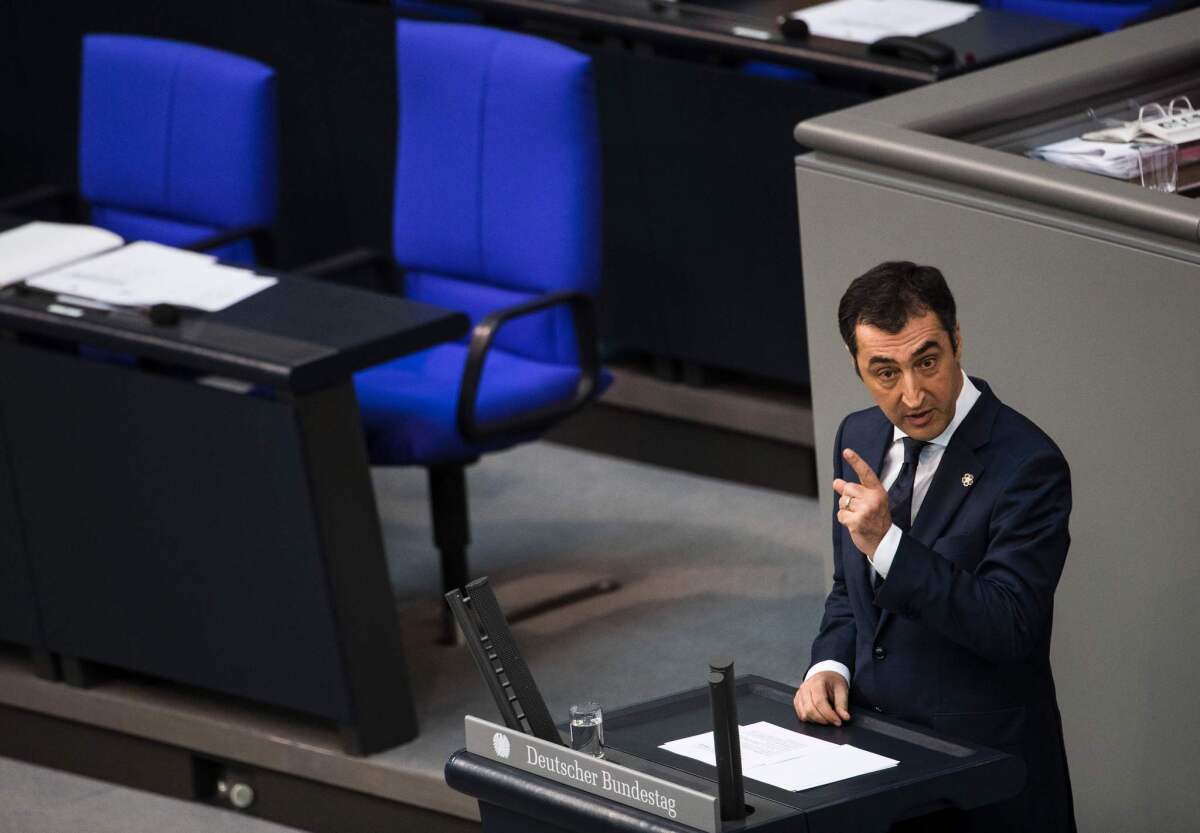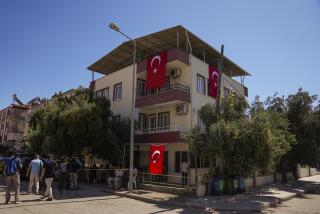Germany becomes a battleground in Turkey’s refusal to acknowledge the Armenian genocide

- Share via
Reporting from Berlin — Arzu Canoglu was born in Turkey 48 years ago, grew up in Germany, loves both countries and speaks both languages fluently.
That places the dual citizen in the middle of a bitter debate that erupted this month when the German Parliament passed a resolution declaring that the slaughter of some 1.5 million ethnic Armenians by Ottoman Turks a century ago was a genocide.
Canoglu, a travel agent in Berlin, had no trouble choosing sides.
“Why are Germans sticking their noses in our history?” she said. “They should come to terms with their own past. Every country has its own dark past.”
Her anger appears to be widespread among the 3.5 million Turks living in Germany. While the resolution was introduced and championed by German legislators with Turkish roots, some are now facing death threats. The Turkish government has also been lashing out at the politicians — and fanning more anger.
See the most-read stories in World News this hour >>
Turkey has long rejected the term genocide to describe the massacres in 1915 and 1916, arguing that the killings cannot be separated from the historical context of global upheaval during World War I and that many Turks were also killed. But most historians outside Turkey describe a state-organized campaign of ethnic cleansing that unambiguously meets the definition of genocide.
In recognizing it as such, Germany was joining more than 20 other countries that have already done so. While California — with a large Armenian population in the Los Angeles area — and some other U.S. states recognize the genocide, the federal government has not because it does not want to alienate Turkey, an important ally in the Middle East.
Why are Germans sticking their noses in our history? They should come to terms with their own past.
— Arzu Canoglu, Berlin travel agent, born in Turkey
Germany, too, has a strong interest in maintaining good relations with Turkey, especially as Europe deals with a flood of refugees from Syria and elsewhere, helping explain why the government of Chancellor Angela Merkel at first tried to prevent the resolution from reaching Parliament. In the end, it passed with only one “no” and Merkel and hundreds of legislators skipping the vote.
The resolution was spearheaded by Cem Oezdemir, a leader of the opposition Greens party who has Turkish roots. He is now facing death threats in Germany and has been assigned police protection.
Back in Turkey, his father’s hometown stripped Oezdemir of his honorary citizenship. The greatest wrath has come from Turkey’s president, Recep Tayyip Erdogan.
“Traitors” is how he has described the 11 members of German Parliament with Turkish roots, all of whom supported the resolution. State-controlled media in Turkey published “wanted” posters with their mugshots.
“What sort of Turks are they?” Erdogan asked. “Their blood must be tested in a lab.”
The comment was especially disturbing in Germany, where it was taken as a reference to the Nazi obsession with Aryan blood lines.
Erdogan accused Oezdemir of lacking character and playing “a leading role in accusing his own country of genocide.”
Oezdemir fired back, telling a German newspaper: “It doesn’t matter what Erdogan says. I’m not going to cave in on the question of Armenian genocide. His threats are only raising my determination to stick with this.”
Another Parliament member with Turkish roots, Oezcan Mutlu, told a German television network he was worried that Erdogan’s attacks could inspire “some insane person taking actions into his own hands.”
Sevim Dagdelen, another of the legislators, said she was proud to have voted for the resolution but was taking the threats seriously: “For the fanatics out there, Erdogan’s words are a call for violence.”
Mitri Sirin, a German TV anchorman with Turkish roots, said the fears are legitimate. Not only were the legislators themselves vulnerable, he said, but so were their relatives back in Turkey.
“Erdogan is hugely popular in Turkey and among a lot of Turks in Germany, who mostly follow Turkish media,” he said.
MORE: Get our best stories in your Facebook feed >>
Merkel eventually rebuked the Turkish president for his comments: “The accusations and statements coming out of Turkey are incomprehensible,” she said.
To Germans, who have embraced their own genocidal history, Turkey’s refusal to come to terms with its history is jarring.
As Christians in a predominantly Muslim empire, Ottoman Armenians were declared enemies of the state at the start of World War I on the suspicion that they were collaborating with Russia. Village-by-village mass killings followed, along with expulsion from eastern Anatolia that pushed hundreds of thousands into the Syrian desert, where they died for lack of food, water or shelter.
Last year, the Turkish government offered condolences to descendants of Armenians killed. But Turkey has continued to reject the term genocide.
Many Turks only learn the other side of the story outside of Turkey.
“I grew up never hearing a word about the genocide of the Armenians until I went away to college and was enlightened by other students,” said one woman who was raised in Germany by Turkish immigrant parents. “I was shocked, and started asking my father about it. But it was never discussed. No one wanted to talk about it.”
Now 45 and a banker in Berlin, she agreed to be interviewed on the condition that she be identified only by her first name, Ayse.
Publicizing her acknowledgement of the genocide, she said, could create problems for her relatives in Turkey.
Kirschbaum is a special correspondent.
ALSO
Are the media complicit in mass shootings?
Chile embarrasses Mexico, 7-0, in Copa America quarterfinal
Temperatures set to top 120 degrees as monster heat wave hits Southern California
More to Read
Sign up for Essential California
The most important California stories and recommendations in your inbox every morning.
You may occasionally receive promotional content from the Los Angeles Times.










